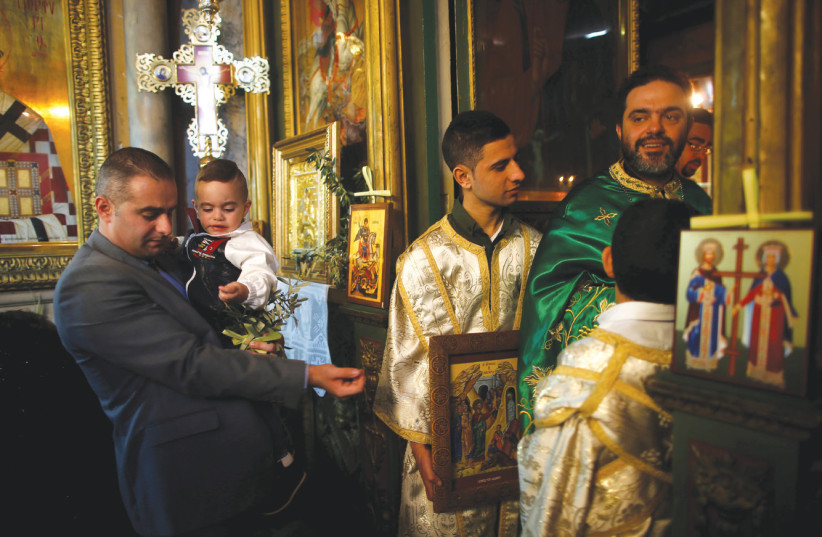Thousands of Gazans will become Christian, Palestinian Evangelical predicts
An ex-member of the Fatah terrorist organization, who embraced Christianity in the early 1990s, has asserted that a considerable number of Muslims in Gaza are likely to forsake Islam in the aftermath of the Israel-Hamas War, gravitating towards Christianity.
Speaking to Joel Rosenberg on the latest episode of the Rosenberg Report, which aired on Trinity Broadcasting Network (TBN) over the weekend, Taysir “Tass” Abu Saada said that he predicts many Gazans will feel so hopeless, lost and lied to by Hamas after the war that they will abandon Islam and Hamas’s extremism for the teachings of the Bible.
“Hamas is an ideology that is spread among many people, not only in the Gaza Strip but all over the world,” Saada told Rosenberg. “However, God has a plan. And I believe the Arabs’ and the Jews’ plan is also part of that, and that is where my hope is.
“That is why I am back in the Holy Land, to move to the Gaza Strip and take part in rebuilding,” Saada continued. “I believe with all the destruction, with all that happened, with the hardship the Palestinians have gone through, they cannot sit back but will ask, ‘Why?’
“God is going to do a lot of work,” in Gaza, he said, “and I want to be a part of that.”
‘The harvest is going to be huge’
The Christian convert said that he already has a team on the ground ministering to Gazans during the war, and these individuals are telling him that “the harvest is going to be huge.”
Saada was born in Gaza in 1951, and moved with his family to Saudi Arabia and Qatar at a young age. According to a testimony he provided to jewishroots.net, in the 1970s, he became a follower of Yasser Arafat, eventually running away from his family to join the Fatah terrorist organization.
“After the Six Day War, I felt as if I was having a nervous breakdown, and my hatred just grew and grew,” he said in the testimony. “I did not understand how we could lose so many wars against Israel; we were bigger than Israel in numbers and size, we had more equipment – everything we had was more than they had, but still we lost the wars against them.
“I was thinking that once again, our leaders sold us to the Jews,” he continued. “That was when I decided to go and fight for our land, which I believed was ours.”
His parents would not allow him to leave school, so he ran away. It took several years for his parents to find him. When they did, he was forced to return to Qatar.
A series of violent incidents in the country landed him in legal trouble. Ultimately, Saada was sent to America. He slowly integrated, found an American wife, and eventually met a Christian who helped him convert.
That Christian told him that “if you want to experience the peace of mind that I have, you have to love the Jews,” Saada recalled in his testimony. “I completely froze and asked him how he could even think of such a thing – to love the Jews? He knew I hated them. For me, as for most Arabs, a good Jew was a dead Jew.”
But that night, he and his Christian mentor read the Bible. The next day, Saada felt an urge to pray. “The first people that came to my heart to pray for were the Jewish people,” he told jewishroots.net. “I was praying, ‘Oh, God, bless your people, Israel. God, gather them to the Promised Land.’”
Soon, he learned that his son had converted, too. Ultimately, his wife also found Christianity. Together, they started an Evangelical ministry for Muslims called Hope for Ishmael and a humanitarian organization called Seeds of Hope, which operates in the Middle East.
“What we are seeing today happening is really one of the signs of the end of times because it is not normal, the destruction that is taking place,” Saada said in his interview with Rosenberg. “The evil hand of Hamas is attacking Israelis in a radical, very evil way. Naturally, Israel had to respond and defend itself.”

‘We can plant a seed in the hearts of the younger generation’
Still, he said that Israel’s response has led to the death of too many Gazan civilians.
In Saada’s vision, the solution is a two-state solution in which the Palestinians continue to live in Gaza, but Israel gains oversight and authority over the West Bank. He told Rosenberg that the Palestinians would first undergo a period of integration and ultimately become citizens of the State of Israel.
“We can plant a seed in the hearts of the younger generation,” he said, “putting hope in the hearts of the Israelis and Palestinians to see that there is a way; there is an idea that we can live together in one state: Israel, with the West Bank.”





Comments are closed.